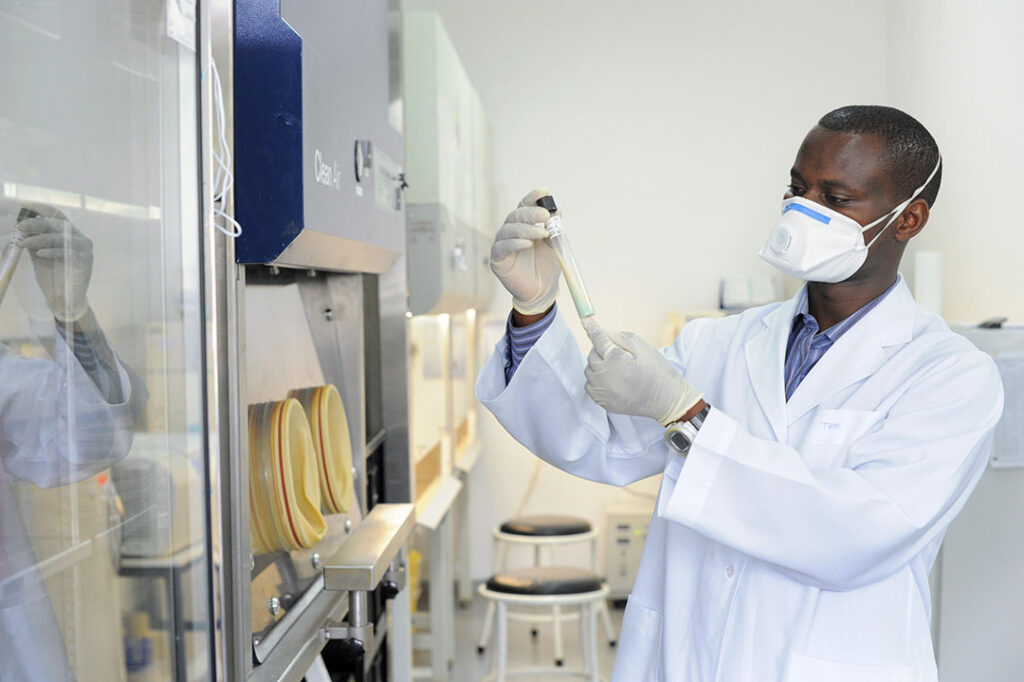ADF STAFF
A year after COVID-19 entered the global vocabulary, the announcement of new vaccines has raised hopes that life soon may return to normal. Across Africa, public health leaders say the continent still faces some darkness before the dawn arrives.
Second Wave
After peaking this summer, Africa’s COVID-19 infection rates have risen again, in some cases more sharply than the original wave. The continent now is reporting more than 2.5 million cases — a 150% jump from the 1 million mark reached in August.
Southern Africa, still the continent’s COVID-19 hot spot, saw a 35% increase in cases between mid-November and mid-December, according to the Africa Centres for Disease Control and Prevention (Africa CDC).
Dr. John Nkengasong, Africa CDC director, recently tied the second wave to the lifting of lockdowns and reopening of borders after the first peak passed.
“Once you lift your public health measures quickly, the virus comes back with a vengeance,” he said during a weekly update on December 17.
Morocco, Niger, South Africa and Tunisia are leading the second wave of infections, he said.
After the summer peak, it appeared Niger had beaten the virus, only to see it come roaring back this fall.
South Africa also is among a handful of countries in the world reporting the arrival of a new variant of the virus that appeared recently in the United Kingdom.
Vaccination Plans
Even as COVID-19 vaccines make news in Europe and North America, it’s unclear when Africans will get their first doses. The African Union, African Export-Import Bank and other groups are working with international organizations to secure vaccines.
At the same time, they are looking to increase Africa’s capacity for manufacturing COVID-19 vaccines. Doing so will boost confidence in the vaccine and ensure adequate supply for the effort to vaccinate more than 700 million people to reach herd immunity, Dr. Nicaise Ndembi, senior science advisor on vaccines for the Africa CDC, told ADF.
Although demand for the early vaccines is one hurdle, the technology to maintain them at a required temperature of either minus 70 or minus 25 degrees Celsius is another. Few African facilities can produce those temperatures, according to Ndembi.
Leaders are watching the development of other COVID-19 vaccines, with a focus on those — such as the recently announced Oxford/AstraZeneca version — that can survive at routine refrigeration temperatures.
“The three or so vaccines that have been announced are not the only ones,” Nkengasong said.
He expects to have a menu of vaccines to choose from in January and proceed with a continentwide vaccination program at some point after that. Ethiopian Airlines has said it is ready to deliver vaccines to the continent, even if they require extreme cold storage.
The World Health Organization’s Africa regional office in Brazzaville, Republic of the Congo, hopes to have 3% of Africans vaccinated by March and 20% by the end of 2021. Nkengasong declined to commit to a timetable.
“One of the greatest challenges is how do you deliver vaccine in a timely manner,” Nkengasong said. “I do not know yet when we will be putting vaccinations in the arms of Africans.”
Perceptions
When the continentwide vaccination program gets underway, public health officials will have to get people to accept the treatment. A recent survey of 15,000 people across 15 African nations suggests that will be easier in some places than in others.
In Ethiopia, for example, 94% of the population said they will take the vaccine when it is available. Only 59% of people in the Democratic Republic of Congo said they would do so.
Overall, about 20% of those surveyed said they would refuse a COVID-19 vaccine. In some cases, that’s because the vaccine is new and was developed more quickly than previous vaccines. But in other cases, conspiracy theories, misinformation and rumors have taken the place of facts.
“Those 20% may have influence on the other 80%,” Dr. Raji Tajudeen, head of Africa CDC’s Public Health Institutions and Research, said during the December 17 report. “The findings of this survey will inform the strategy, the public messaging that will be deployed.”
Public health officials must take misinformation seriously if they want the vaccination program to succeed, said Professor Heidi Larson of the London School of Hygiene and Tropical Medicine, who conducted the survey on behalf of the Africa CDC.
“Facts don’t always work when people have deeper anxieties,” Larson said. “But we need to at least address those and not dismiss them as being unimportant.”

